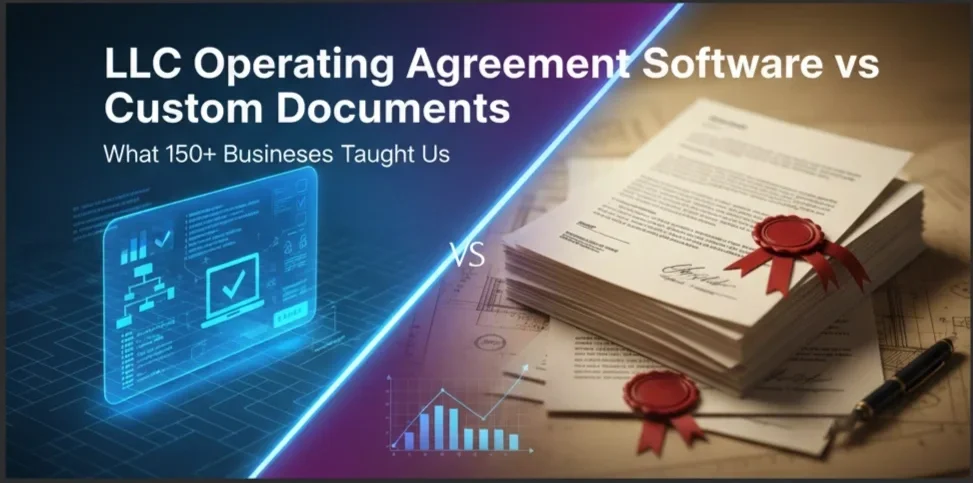LLC Operating Agreement Software vs Custom Documents: What 150+ Businesses Taught Us
After working with over 150 businesses through their LLC formation journey, we've seen the same critical decision point emerge time and again: software-generated operating agreements or custom-drafted documents? The choice seems simple on the surface, but the real-world consequences tell a different story.
The harsh reality? We've watched promising startups hit devastating roadblocks, partnerships implode, and growth plans crumble because founders chose convenience over precision in their foundational documents. But we've also seen businesses thrive when they made informed decisions about their operating agreement approach.
Here's what those 150+ businesses taught us about navigating this crucial choice.
The Allure of Software Solutions: Quick, Cheap, and Tempting
Software platforms promise the world: "Create your LLC operating agreement in 15 minutes!" The appeal is undeniable, especially for cash-strapped startups and time-pressed entrepreneurs. These platforms typically offer guided questionnaires, state-specific templates, and instant document generation for a fraction of attorney fees.
We've seen hundreds of businesses start with these solutions, drawn by the immediate gratification and budget-friendly pricing. The questionnaires feel comprehensive, asking about member percentages, management structure, and basic operational details. The resulting documents look professional, complete with legal language and state compliance assurances.
But here's where the problems start emerging. Software solutions operate on assumptions about "typical" business structures and relationships. They're designed for the average case, not your specific situation. The moment your business deviates from standard templates, whether through unique partnership dynamics, complex equity arrangements, or industry-specific needs, these one-size-fits-all solutions begin to crack.
One tech startup we worked with learned this the hard way. Their software-generated operating agreement included standard buyout provisions that seemed reasonable until a co-founder wanted to exit. The template's rigid valuation method and timeline requirements created a six-month legal nightmare that nearly killed their Series A funding round.
The Custom Document Advantage: Precision That Prevents Problems
Custom-drafted operating agreements represent the opposite approach: documents crafted specifically for your business structure, relationships, and anticipated challenges. These aren't just templates with your name filled in; they're strategic legal frameworks designed around your unique circumstances.
The businesses that invested in custom documents consistently reported fewer disputes, smoother operations, and easier navigation of complex situations. Why? Because these agreements anticipate the specific challenges their business might face rather than hoping generic provisions will suffice.
Consider the difference in management structure provisions. Software solutions typically offer basic options: member-managed or manager-managed. Custom documents can create nuanced governance structures that reflect actual decision-making processes, whether that involves different voting requirements for different types of decisions, specialized committees for specific functions, or unique authority distributions among members.
We've seen this play out repeatedly. A family business with three generations involved needed different voting weights for different types of decisions, seasonal management transitions, and succession planning provisions. No software solution could handle this complexity, but a custom document created a framework that prevented conflicts and enabled smooth operations across multiple family dynamics.
The Hidden Cost Factor: Cheap Upfront, Expensive Later
The cost comparison between software and custom documents seems straightforward initially. Software solutions range from $50 to $500, while custom documents can cost $1,500 to $5,000 or more. For budget-conscious entrepreneurs, the math appears obvious.
But this analysis misses the total cost of ownership. Contracts aren't just paperwork; they're business partners that never sleep, and poorly designed agreements create ongoing expensive problems.
We've tracked the true costs across our client base. Businesses with software-generated agreements averaged 3.2 legal interventions within their first two years of operation, typically costing $2,000 to $8,000 per incident. These interventions included dispute resolutions, document amendments, and clarification projects that could have been prevented with proper initial drafting.
Meanwhile, businesses with custom operating agreements averaged 0.7 legal interventions in the same timeframe, and these were typically minor amendments or updates rather than crisis management situations.
One manufacturing LLC used a software solution for their initial agreement, saving $3,000 in upfront costs. Within 18 months, they'd spent $12,000 on legal fees addressing ambiguous provisions, updating inadequate dispute resolution procedures, and restructuring member equity arrangements that the template couldn't properly handle.
Complexity Indicators: When Software Falls Short
Through our experience with 150+ businesses, clear patterns emerged regarding when software solutions become inadequate. These complexity indicators consistently predicted which businesses would face problems with template-based agreements.
Multi-member dynamics create the highest risk for software solutions. Any LLC with more than two members, especially when members have different contribution types (cash, property, services), different ongoing roles, or different risk tolerances, typically needs custom provisions that software can't provide.
Industry-specific requirements represent another major software limitation. Businesses in regulated industries, those requiring professional licensing, or companies with unique operational models need specialized provisions that generic templates don't address.
Growth planning considerations often exceed software capabilities. If your business anticipates bringing in investors, adding new members, or expanding into new markets, your operating agreement needs provisions that support these transitions rather than creating barriers.
Family or personal relationships among members require careful handling that software solutions rarely provide. These situations need detailed procedures for handling conflicts, managing different generations' involvement, and protecting both business and personal relationships.
Real-World Scenarios: Where the Rubber Meets the Road
The businesses that taught us the most were those that faced unexpected situations their operating agreements needed to handle. These real-world scenarios revealed the practical differences between software and custom approaches.
Scenario 1: The Unexpected Exit
A marketing agency used software to create their three-member operating agreement. When one member received a job offer requiring relocation, their template's buyout provisions created chaos. The standard valuation method didn't account for client relationships and work-in-progress, the timeline requirements conflicted with their cash flow cycle, and the mandatory mediation process delayed resolution for months.
A similar agency with a custom agreement faced the same situation but navigated it smoothly. Their agreement included specific valuation methods for their industry, flexible payment terms aligned with their revenue patterns, and streamlined procedures for voluntary exits.
Scenario 2: The Investment Opportunity
Two e-commerce businesses received similar investment offers within our client base. The company with a software-generated agreement spent eight weeks and $15,000 in legal fees restructuring their member arrangements, voting procedures, and profit distribution terms to accommodate the investor's requirements.
The business with a custom agreement had anticipated this scenario. Their document included provisions for new member admission, investor protection requirements, and flexible governance structures that required only minor amendments to close their funding round.
The Decision Framework: Choosing Your Path
Based on our experience with 150+ businesses, the decision framework for choosing between software and custom documents should consider several key factors working together, not just upfront cost or convenience.
Business complexity analysis should be your starting point. Single-member LLCs with straightforward operations can often succeed with quality software solutions, especially if the member doesn't anticipate significant changes or growth in the near term.
Relationship dynamics among members require honest assessment. If all members have similar backgrounds, investment levels, and expectations, software solutions may suffice. But any differences in contribution types, ongoing roles, risk tolerance, or exit timelines suggest the need for custom provisions.
Industry and regulatory considerations often determine the choice. Businesses in regulated industries, those requiring professional licensing, or companies with unique operational models typically need custom documents regardless of other factors.
Growth and investment plans should influence your decision timeline. Even if your current situation could work with software solutions, anticipated growth, investor involvement, or expansion plans may justify investing in custom documents from the beginning.
Making the Right Choice for Your Business
The lesson from 150+ businesses isn't that one approach is universally better than the other. Instead, it's that the right choice depends on making an informed decision based on your specific circumstances and future plans.
Strategic founders understand that having the right legal documents ready prevents problems before they arise. This principle applies especially to operating agreements, which serve as the constitutional framework for your business operations.
If you're considering software solutions, be honest about your complexity factors and have a plan for upgrading to custom documents when your business outgrows template limitations. If you're investing in custom documents, work with attorneys who understand your industry and growth plans to create agreements that support your long-term success.
The businesses that succeeded long-term didn't just choose the cheapest option or the most convenient solution. They made strategic decisions about their foundational documents based on realistic assessments of their needs, relationships, and ambitions. When you're scaling fast, being legally built to handle growth requires documents that can evolve with your business rather than constraining it.
The choice between software and custom operating agreements isn't just about immediate costs or convenience. It's about creating a legal foundation that supports your business objectives, protects your relationships, and enables the growth you're working so hard to achieve.







